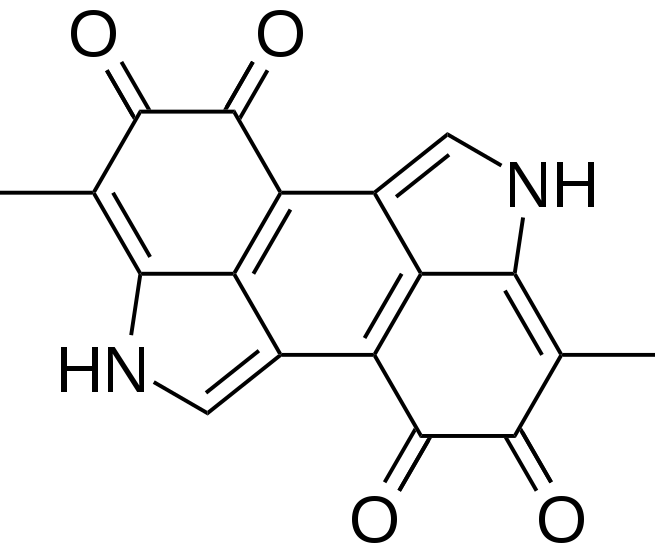Main Difference
The main difference between Melanin and Melatonin is that the Melanin is a group of natural pigments found in most organisms and Melatonin is a hormone that is produced by the pineal gland in animals and regulates sleep and wakefulness.
-
Melanin
Melanin ( (listen); from Greek: μέλας melas, “black, dark”) is a broad term for a group of natural pigments found in most organisms. Melanin is produced through a multistage chemical process known as melanogenesis, where the oxidation of the amino acid tyrosine, is followed by polymerization. The melanin pigments are produced in a specialized group of cells known as melanocytes.
There are three basic types of melanin: eumelanin, pheomelanin, and neuromelanin. The most common type is eumelanin, of which there are two types—brown eumelanin and black eumelanin. Pheomelanin is a cysteine-derivative that contains polybenzothiazine portions that are largely responsible for the color of red hair, among other pigmentation. Neuromelanin is found in the brain. Research has been undertaken to investigate its efficacy in treating neurodegenerative disorders such as Parkinson’s. In the human skin, melanogenesis is initiated by exposure to UV radiation, causing the skin to darken. Melanin is an effective absorbent of light; the pigment is able to dissipate over 99.9% of absorbed UV radiation. Because of this property, melanin is thought to protect skin cells from UVB radiation damage, reducing the risk of folate depletion and dermal degradation, and it is considered that exposure to UV radiation is associated with increased risk of malignant melanoma, a cancer of melanocytes (melanin cells). Studies have shown a lower incidence for skin cancer in individuals with more concentrated melanin, i.e. darker skin tone. However; the relationship between skin pigmentation and photoprotection is still uncertain.
-
Melatonin
Melatonin is a hormone that regulates sleep–wake cycles. It is primarily released by the pineal gland. As a supplement, it is often used for the short-term treatment of trouble sleeping such as from jet lag or shift work. Evidence of benefit, however, is unclear. One review found onset of sleep occurred 6 minutes faster with use but found no change in total time asleep. It may work as well as the medication ramelteon. It is typically taken by mouth.Side effects from supplements are minimal at low doses for short durations. Side effects may include sleepiness, headaches, nausea, diarrhea, and abnormal dreams. Use is not recommended during pregnancy or breastfeeding. Use is also not recommended in those with liver problems.In animals (including humans), melatonin is involved in synchronizing the circadian rhythms including sleep–wake timing, blood pressure regulation, and seasonal reproduction. Many of its effects are through activation of the melatonin receptor, while others are due to its role as an antioxidant. In plants it functions to defend against oxidative stress. Melatonin is also present in various foods.Melatonin was discovered in 1958. It is sold over the counter in Canada and the United States. In the United Kingdom it is a prescription-only medication. A month’s supply costs about US $1 to 4 in the United States. In the United Kingdom a month’s supply costs the NHS about 15 pounds per month. It is not FDA-approved for any use. In Australia and Europe, it is approved for trouble sleeping in people over the age of 54.
-
Melanin (noun)
Any of a group of naturally occurring dark pigments, especially the pigment found in skin, hair, fur, and feathers.
-
Melatonin (noun)
A hormone, related to serotonin, that is secreted by the pineal gland, and stimulates colour change in the skin of reptiles, and is involved in the sleep/wake and reproductive cycles in mammals
-
Melatonin (noun)
Any material similar in its chemistry and effect to the natural hormone.
-
Melanin (noun)
a dark brown to black pigment occurring in the hair, skin, and iris of the eye in people and animals. It is responsible for tanning of skin exposed to sunlight.
-
Melatonin (noun)
a hormone secreted by the pineal gland which inhibits melanin formation and is thought to be concerned with regulating the reproductive cycle.

